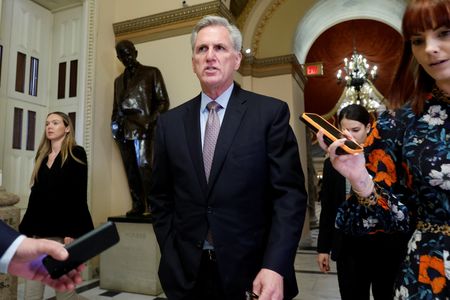 1
1 1
1
By Richard Cowan
WASHINGTON (Reuters) – U.S. House Speaker Kevin McCarthy has begun working in earnest to persuade his fellow Republicans to support a $1.5 trillion increase in the nation’s debt ceiling, amid early indications of a possible revolt in his thin majority.
McCarthy faces the toughest test of his young speakership with a bill he hopes to pass in the House of Representatives next week — a measure that rankles some in his rank-and-file by authorizing more government debt. He is trying to couple it with tough new spending controls.
It is his opening shot in a negotiation with Democratic President Joe Biden, whose party also controls the U.S. Senate. If the divided Congress fails to raise the federal government’s $31.4 trillion debt ceiling, the government could face a default that would shake the U.S. and world economies.
“We’re in very good shape. We just rolled it out yesterday. We’re working, talking through all the members,” McCarthy told reporters on Thursday.
Financial markets are already showing signs of worry about the standoff, with the cost of insuring exposure to U.S. debt at its highest level in a decade and financial analysts raising concerns about rising risk of default.
Several House Republicans on Thursday either raised concerns about the proposal or acknowledged a tough battle ahead on a bill that is unlikely to win Democratic support.
U.S. Representative Don Bacon, a Republican from Nebraska, told reporters he supports the legislation but said if the vote were held on Thursday it might not pass, as some in the caucus are “struggling” with it.
It is not unusual for members of Congress to sometimes withhold their support for legislation as a way of winning concessions. That does not mean that in the end they will defy their leadership.
McCarthy faces a tough path as he can lose only five votes from his razor thin 222-member majority to pass legislation if Democrats remain united in opposition. It took him 15 rounds of voting in January to win the speakership, a sign of the dissension within the caucus about his leadership.
His bill would have to win over at least three camps of doubters: Those who think it does not go far enough in taming federal deficits; those who think it will hurt their constituents, and those who have not voted for a debt limit increase before and might never in the future.
“There are just some concerns there’s no plan to balance the budget … in any time frame and this is an opportunity to do that,” said Representative Nancy Mace, who added that she is worried that proposals to roll back some sweeping tax credits related to solar energy could hurt her South Carolina constituents.
Hardline conservative Representative Chip Roy, who is on the powerful House Rules Committee that is the gatekeeper of all legislation, told reporters he was weighing whether the spending cuts were “robust enough.”
Representative Tim Burchett, who represents a Tennessee district that includes the city of Knoxville, which has a poverty rate of about 21%, expressed worries about a provision to tighten eligibility for the SNAP food stamp program.
Nonetheless, Burchett added, “The most important thing to me is reducing debt. That’s going to sink us.”
The White House criticized McCarthy’s plan as draconian, with Press Secretary Karine Jean-Pierre saying, “MAGA House Republicans are holding the American economy hostage in order to take a hatchet to programs Americans rely on every day to make ends meet.”
Bacon said that if House Republicans fail to pass this bill, “There’s going to be a lot of pressure to just capitulate” to Democrats who demand a “clean” increase in borrowing authority without spending cuts attached.
“That’s not the right answer,” he responded.
(Reporting by Richard Cowan, additional reporting by Katharine Jackson; Editing by Scott Malone and Diane Craft)